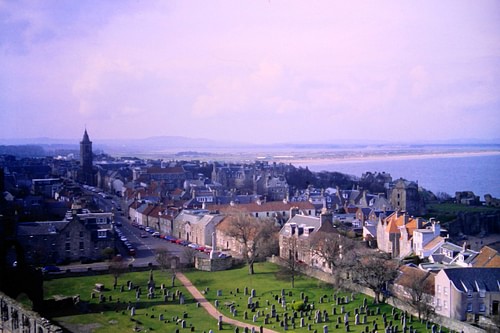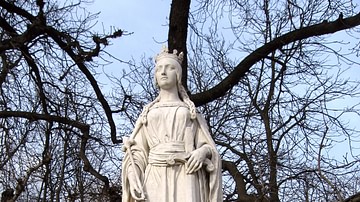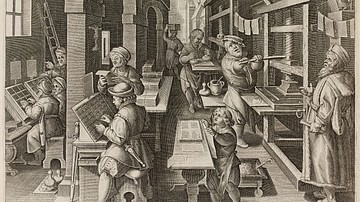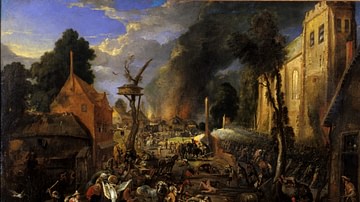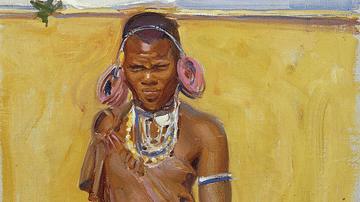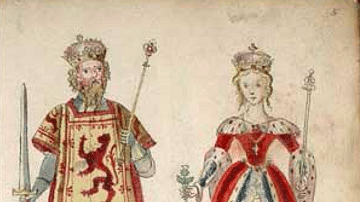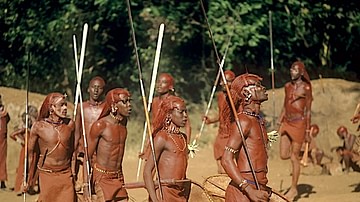The Flemish are among the most important and perhaps the most underappreciated immigrant groups to have shaped the history of medieval and early modern Scotland. They came to Scotland as soldiers and settlers, traders and artisans, diplomats, and dynasts, over a period of several centuries. Several of Scotland’s major families – the Flemings, Murrays, Sutherlands, Lindsays, and Douglases for instance – claim elite Flemish roots, while many other families can trace their ties to Flemish people who arrived as craftspeople, mercenaries, and religiously persecuted émigrés.

In this interview, James Blake Wiener speaks to Doctor Alexander Fleming and Professor Roger Mason, authors of Scotland and the Flemish People in order to learn more about the many ways the Flemish shaped Scotland’s medieval and early modern history.
JBW: How and why did medieval Flemish and their relationship with Scotland catch your attention?
AF and RM: Very little research has been undertaken on the relationship between Flanders and Scotland. What published research has been done took place a number of years ago (in the 1930s and the 1980s), and some academics have questioned its methodology and conclusions. Moreover, current textbooks on Scottish history make scant reference to the Flemish influence on Scotland in the medieval period, and there was a suspicion that the role of these immigrants has been understated. Hence, we felt that there was a need to review the evidence surrounding the relationship between Flanders and Scotland.
JBW: What were the major factors that led the Flemish to migrate to Scotland in medieval and early modern times? Does one factor stand out more than any of the others?
AF and RM: Flemish knights took part in the invasion of Britain in 1066. They were initially given land in England as a reward for participating in the invasion. On becoming King of Scots in 1124 David I of Scotland brought numbers of Flemish up from England to assist him in the economic and social transformation of the country. From the 12th century onwards Scotland benefited from the migration and settlement of Flemish craftspeople and farmers, as well as elite fighting men and merchants. The burgeoning wool trade with Flanders had brought to Scotland the merchants as well as other specialists associated with sheep rearing.
In the 16th century, the Spanish response to the Protestant Reformation in Continental Europe led to the persecution of Protestants in the Low Countries. Many Protestants, some from Flanders, therefore, fled to England, and some may have moved up to Scotland. This was likely a much less significant source of migrants than the other two aforementioned, which were at root stimulated by economic factors – a quest for land in the case of the early knights and economic opportunity in the case of merchants and craftsmen.
JBW: I suspect that many readers tend to think of the Flemish by virtue of their commanding role in the economic, social, and cultural affairs in late-medieval Europe – during the era of the Burgundian State – and later when Antwerp emerged as the capital of early-16th century European finance. Why is public awareness of their impact minimal in Scotland and elsewhere? I suspect the Flemish themselves know relatively little about their role in early Scottish history as well.
AF and RM: As noted above, much of the existing literature relating to the Flemish involvement in Scotland is very dated and has, in any case, not been easily accessible to the public at large. Furthermore, there had not been a comprehensive, readable history prepared on the topic up until now. Putting that aside, our research found that the Flemish influence was brought to bear over a quite extensive period – perhaps in the order of 600 years – so while they had an impact of some significance, elements of which can still be seen today, it was not easily discernible year upon year. The Flemish migrants were very adaptable and quickly became absorbed into Scottish society, a process of 'Scotticisation', as we call it in our book. This process also has tended to shroud the Flemish influence on Scotland.
JBW: I have read previously that it was Flemish or Dutch émigrées who brought the game of golf to Scotland, however, I had no idea that the Flemish left their imprint with regard to medieval and early modern urban planning. Could you tell us more about their contributions therein?
AF and RM: This question is best addressed by citing specific examples. A notable Flemish immigrant was Mainard the Fleming, who was brought to Scotland by David I in the mid-12th century. He was initially placed in Berwick-upon-Tweed, where he was credited with laying out its plan. He was then moved to St. Andrews, an ancient religious site on Scotland’s Fife coast, that was emerging as the ecclesiastical capital of the country. Mainard was then credited with developing and implementing a master plan for St. Andrews. This east-west, wedge-shaped plan became the town's defining characteristic and remains so to this day.
Our book also sets out the Flemish architectural influence on a number of Scottish churches. Furthermore, in certain parts of Scotland, and most notably in a number of Fife villages bordering the Forth River, some domestic architecture has distinct Flemish/Dutch features. Such features are 'crow stepped' gables and roofing of red and gray clay pantiles.
JBW: Were there any periods of pervasive discrimination against Flemish in Scotland? Or did the Scots see the Flemish as desirable migrants because of their craftsmanship and capital?
AF and RM: This is a difficult question to answer. Some of the early Flemings brought into Scotland by David I may have been used to pacify parts of the country, the presumption being that their presence may not have been totally welcome by the inhabitants in these areas. However, what evidence there is points to the Flemish being well-received and not the object of discrimination.
The Flemish merchants and craftsmen were highly regarded by the Scots. The former helped to stimulate the wool trade between Scotland and Flanders, thus leading to significant economic benefit. The latter, the craftspeople – notably the weavers – were held in high regard, and in the late 16th century, the Scottish government even provided incentives to bring Flemish weavers to Scotland to provide what we today would describe as 'technical assistance'. Those who chose to remain in Scotland were absorbed seamlessly into Scottish life with no evidence of discrimination.
JBW: Did the Scots not form émigré communities in Flanders and Holland, too? Especially after the marriage of James II of Scotland and Mary of Guelders, I imagine there was a great uptick in traffic between Scotland and Flanders.
AF and RM: Given that much of Scottish wool exports went through the Flanders port of Bruges it is not perhaps surprising that a community of Scots sprung up in that town, oiling the wheels of trade. There is evidence that this community also had its own place of worship. We are fortunate that the ledger of the late 15th-century Scottish merchant, Andrew Halyburton, has survived. Largely based in Middelburg, he had extensive links with Bruges and Antwerp and acted as a factor for the Scottish elite, sourcing and supplying the luxury goods that Flanders was famed for. Halyburton married Cornelia Bening, the daughter of the Scotto-Flemish artist and illuminator Alexander Bening, who had close family and professional links with Hugo van der Goes and the Bruges-Ghent artistic community. Van der Goes’ famed Trinity Altarpiece (now in the Scottish National Gallery) was a product of these interconnections.
JBW: While it may be an exaggeration to say that up to a third of the current Scottish population has Flemish ancestors, it is undoubtedly true that the medieval and early modern contributions of the Flemish to Scotland are profound. In your own words then, why is it important that we acknowledge their impact and legacy?
AF or RM: There is undoubtedly a significant number of Scottish people whose families have their roots in medieval Flanders. Many will not be aware of this fact, so one of the goals of the Scotland and the Flemish People project, and the book of the same name, was to raise awareness on this topic among the population at large. It is important that we acknowledge the impact and legacy of the Flemish in Scotland as this has not been properly appreciated in existing works of Scottish history.
In our book, we have sought to rectify this deficiency. The Flemish who came to Scotland between the 12th and 16th centuries have left indelible traces on the Scottish landscape, its language and culture, as well as its social and political identity. It has been important that, for the first time, the facts pertaining to the long relationship between Flanders and Scotland have been examined, assessed, and set out in a form that is accessible to historians and the public at large.
JBW: Many thanks for speaking with us about an intriguing subject – I wish you both many happy adventures in research.
Alexander Fleming is an economist who held positions at the Bank of England, University of St Andrews and the World Bank. He was awarded an Honorary LLD from the University of St Andrews in 1999.
Roger Mason is Emeritus Professor of Scottish History at the University of St. Andrews. He has published widely in the field of late medieval and early modern Scottish political thought and culture.

